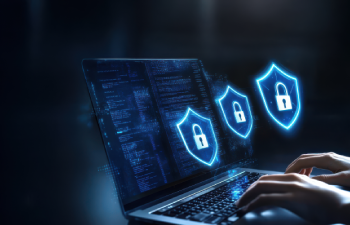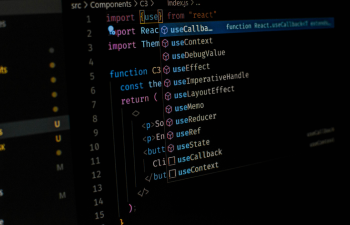-
All Courses
- Cyber Security
- Project Management
- Agile and Scrum
- Cloud Computing and DevOps
- IT Service Management and Architecture
- Quality Management
- Software Development
- Generative AI and AIML
- Data Science and Business Analytics
- Digital Marketing
- Accounting and Finance
- Other
Cyber Security
Protect What Matters Most
Master threat detection, ethical hacking, and compliance strategies with Nvidya’s expert-led cybersecurity training. Stay ahead of evolving risks and become the shield your organization needs.
Top Certifications: CEH, CompTIA Security+, CISSP
CISSP Certification - Certified Information Systems Security Professional Training
View Program
CISM Certification: Certified Information Security Manager
View Program
CISA Certification: Certified Information Systems Auditor
View Program
CompTIA Security+ (Plus) Certification - SY0-701
View Program
CEH Certification - Certified Ethical Hacking Course
View Program
CCSP Certification: Certified Cloud Security Professional
View Program
Executive Certificate Program in Cybersecurity
View Program
Advanced Executive Certificate Program in Cybersecurity
View Program
Cyber Security Expert Masters Program
View Program
Professional Certificate Program in Cybersecurity
View ProgramProject Management
Lead with Confidence, Deliver with Impact
Gain control over complex projects with PMP®, PRINCE2®, and other top-tier certifications. Learn practical tools and methodologies to drive successful outcomes—on time and within scope.
Featured Paths: PMP, PRINCE2, Microsoft Project
PMP Certification Training
View Program
CAPM® Certification Training Course
View Program
PMP® Certification Training with Exam - Elite
View Program
PMP® Renewal Pack Bundle
View Program.png)
PMP® Plus
View Program
Post Graduate Program In Project Management
View Program
PRINCE2 Agile Certification Training
View Program
Prince 2 Foundation Training
View Program
PRINCE2® Foundation and Practitioner 7th Edition Certification Training
View Program
Professional Certificate Program in Project Management
View ProgramAgile and Scrum
Empower Teams. Embrace Agility.
Elevate your workflow with Agile and Scrum training tailored for today’s fast-paced environments. Master sprint planning, backlog management, and Agile leadership.
Popular Roles: Scrum Master, Product Owner
Certified Scrum Product Owner (CSPO) Certification Training
View Program
Certified ScrumMaster (CSM) Certification
View Program
Professional Scrum Product Owner (PSPO) Certification Training
View Program
Professional Scrum Master (PSM) Certification Training
View Program
Professional Scrum Master™ (PSM) II Certification Training
View Program
Professional Advanced Certified ScrumMaster® (A-CSM) Certification Training
View Program
Advanced Certified Scrum Product Owner® (A-CSPO®) Certification Training
View Program
SAFe Product Owner/Product Manager (POPM) Certification Training
View Program
Leading SAFe® 6.0 Training with SAFe Agile Certification
View Program
SAFe® 6.0 Release Train Engineer (RTE) Certification
View Program
SAFe® 6 Scrum Master (SSM) Certification Training
View Program
Agile Leadership Masters Program
View Program
Advanced Agile Product Ownership Masters
View Program
Agile Leadership Excellence Masters Program
View Program
ICP-ACC (ICAgile Certified Agile Coaching) Certification Training Course
View ProgramCloud Computing and DevOps
Build, Scale, and Innovate in the Cloud
Gain hands-on experience with cloud platforms and DevOps pipelines. Learn to deploy, manage, and automate infrastructure using AWS, Azure, Docker, Jenkins, and more.
Key Platforms: AWS, Azure, Google Cloud, Docker, Jenkins
Microsoft Azure Fundamentals AZ-900 Certification
View Program
Microsoft Azure Cloud Architect Masters Program
View Program
Professional Certificate Program in Cloud Computing and DevOps
View Program
AWS Cloud Practitioner Essentials Certification
View Program
AWS Solution Architect Certification Training
View Program
DevOps Engineer Masters Program
View Program
Microsoft Azure DevOps Engineer Expert Certification
View Program
Cloud Architect Masters Program
View Program
AWS Cloud Architect Masters Program
View Program
AWS Technical Essentials
View Program
Microsoft Azure Security Engineer - Associate AZ-500 Certification
View Program
AWS SysOps Administrator - Associate Certification
View Program
Microsoft Azure Developer Associate AZ-204 Certification
View Program
Microsoft Azure DevOps Solutions Expert Program
View Program
Microsoft Certified: Azure Administrator Associate AZ-104
View Program
Advanced Architecting on AWS for Solutions Architect - Professional Certification
View Program
AWS DevOps Engineer - Professional Certification
View Program
Microsoft Azure Solutions Architect Expert AZ-305 Certification
View ProgramIT Service Management and Architecture
Design Smarter IT Systems
Streamline IT operations using frameworks like ITIL® and TOGAF®. Align IT services with business strategy while architecting scalable, resilient systems.
Certifications Offered: ITIL®, TOGAF®, COBIT
ITIL® 4 Foundation Certification Training
View Program
ITIL 4 Managing Professional
View Program
ITIL 4 Specialist: Create, Deliver and Support
View Program
ITIL® 4 Specialist: High Velocity IT
View Program
ITIL® 4 Strategist: Direct, Plan, and Improve
View Program
ITIL® 4 Specialist: Drive Stakeholder Value
View ProgramQuality Management
Drive Excellence. Ensure Consistency.
Master Six Sigma, Lean, and TQM to lead process improvements, reduce defects, and enhance customer satisfaction. Build a culture of operational excellence.
Popular Roles: Quality Analyst, Six Sigma Expert
Lean Six Sigma Black Belt Certification Training
View Program
Lean Six Sigma Expert
View Program
Lean Six Sigma Green Belt Certification Training
View Program
Professional Certificate Program in Lean Six Sigma
View ProgramSoftware Development
Code Smarter. Build Faster.
From full-stack to front-end, gain expertise in modern programming languages and frameworks to build robust, scalable applications.
Popular Roles: Full Stack Developer, Software Engineer
Automation Test Engineer Masters Program
View Program
Full Stack Java Developer Masters Program
View Program.png)
AI-Powered Full Stack Developer Program
View Program.png)
Professional Certificate Program in Blockchain
View Program
Java Course
View Program
Python Certification Course
View ProgramGenerative AI and AIML
Shape Tomorrow with Smart Tech
Master generative AI models, neural networks, and ML algorithms to create intelligent, adaptive solutions. Learn practical applications in NLP, image generation, and predictive analytics.
Popular Roles: AI Engineer, ML Specialist.png)
Applied Generative AI Specialization
View Program.png)
Generative AI for Business Transformation
View Program
Advanced Executive Program In Applied Generative AI
View Program
Professional Certificate in AI and Machine Learning
View Program
Professional Certificate Program in Generative AI and Machine Learning
View Program
Applied Generative AI & LLM Specialization
View Program
Advanced Certificate Program in Generative AI & Machine Learning
View ProgramData Science and Business Analytics
Turn Numbers into Strategic Decisions
Learn to analyze trends, visualize data, and use predictive modeling tools like Python, R, and SQL to make business-critical decisions.
Popular Roles: Data Scientist, Business Analyst
MySQL DBA Certification Training
View Program
Python Certification Training
View Program
Data Science Certification Training
View Program
MongoDB Certification Training
View Program
Data Science with Python Certification Course
View Program
Apache Cassandra Certification Training
View Program
Teradata Certification Training
View Program
SAS Training and Certification
View Program
Informatica Certification Training Online
View Program
Microsoft SQL Certification Training
View Program
R Programming Course for Data Science
View Program
Data Analyst Course
View ProgramDigital Marketing
Market Smarter in a Digital World
Learn SEO, social media marketing, email campaigns, performance analytics, and more. Master the tools that power digital marketing success.
Key Skills: Google Ads, Analytics, SEO, Content Strategy
Measuring Social Media ROI
View Program
Mastering Google Analytics
View Program
Digital Marketing Certification Training
View Program
Digital Marketing Expert
View Program
Digital Marketing Specialist
View Program
SMstudy® Certified Digital Marketing Associate
View Program
SMstudy® Certified Digital Marketing Professional
View ProgramAccounting and Finance
Master Numbers, Drive Strategy
Build expertise in accounting principles, financial analysis, budgeting, and reporting. Ideal for finance professionals and aspiring CPAs.
Popular Topics: Financial Planning, IFRS, Cost Management
Open Banking, PSD2 and GDPR. FinTech
View ProgramOther

CRM Salesforce for Beginners
View Program.png)
OSCP Penetration Testing
View Program
SCRUM CERTIFIED DEVELOPER
View Program
SCRUM MASTER CERTIFIED
View Program
Scrum Product Owner Certified (SPOC™)
View Program
SCRUMstudy Agile Master Certified
View Program
Scrum Fundamentals Certified
View Program
COBIT Foundation v5
View Program
Extreme Programming Engineering Practices
View Program
Cybersecurity Certification Course
View Program
CompTIA Security+ Certification Training - SY0-601 Exam
View Program
Certified Cloud Security Professional (CCSP) Training & Certification
View Program
PSM 1 Professional Scrum Master Level 1 Training & Certification
View Program
CSM Certified ScrumMaster Training & Certification
View Program
CISA Certified Information Systems Auditor Training & Certification
View Program
SAFe® 5.1 Advanced Scrum Master (SASM) Certification
View Program
SAFe® 5.1 Product Owner Product Manager Certification (POPM)
View Program
Certified Scrum Product Owner Certification
View Program
Certified Ethical Hacking Course - CEH v12
View Program





